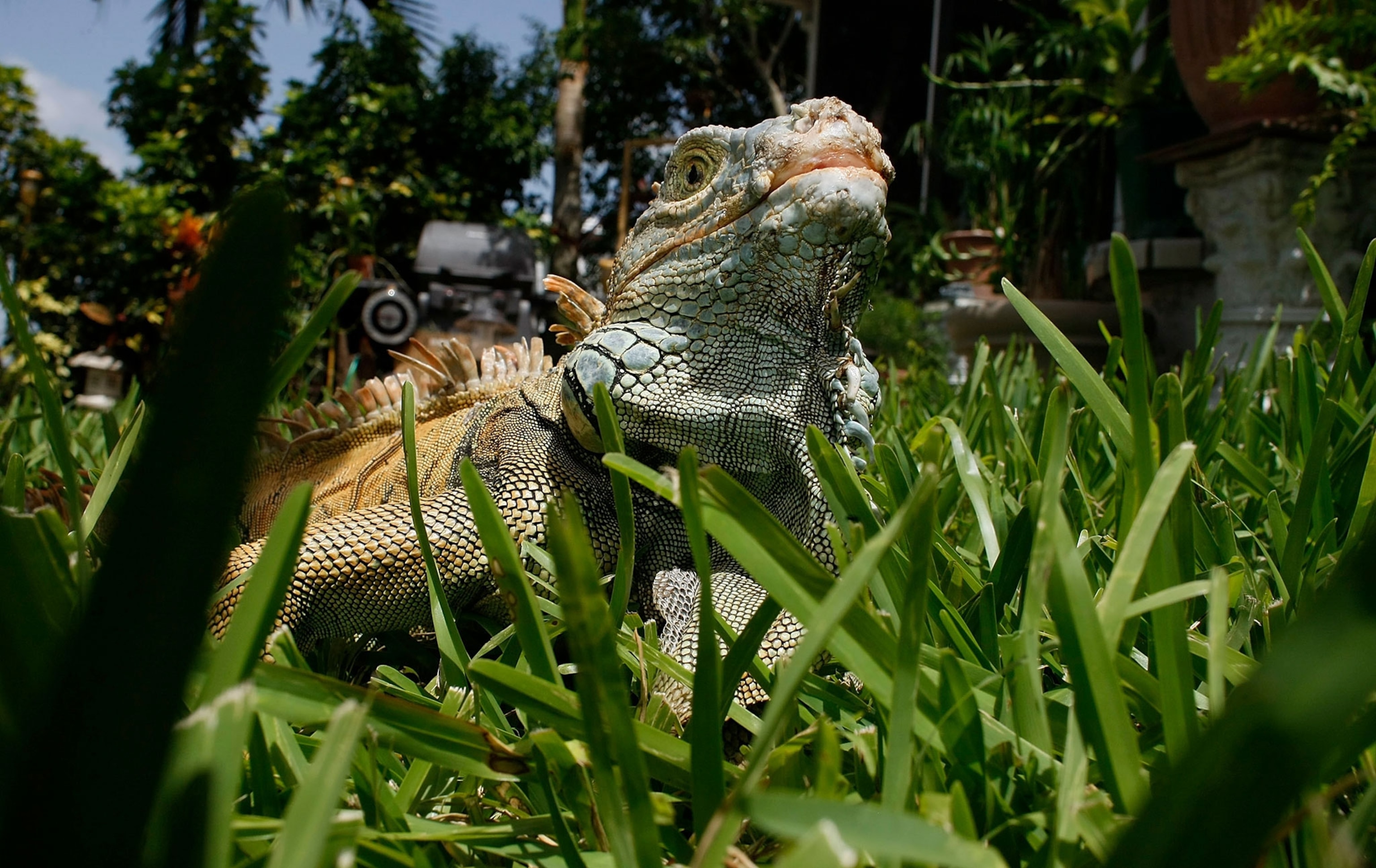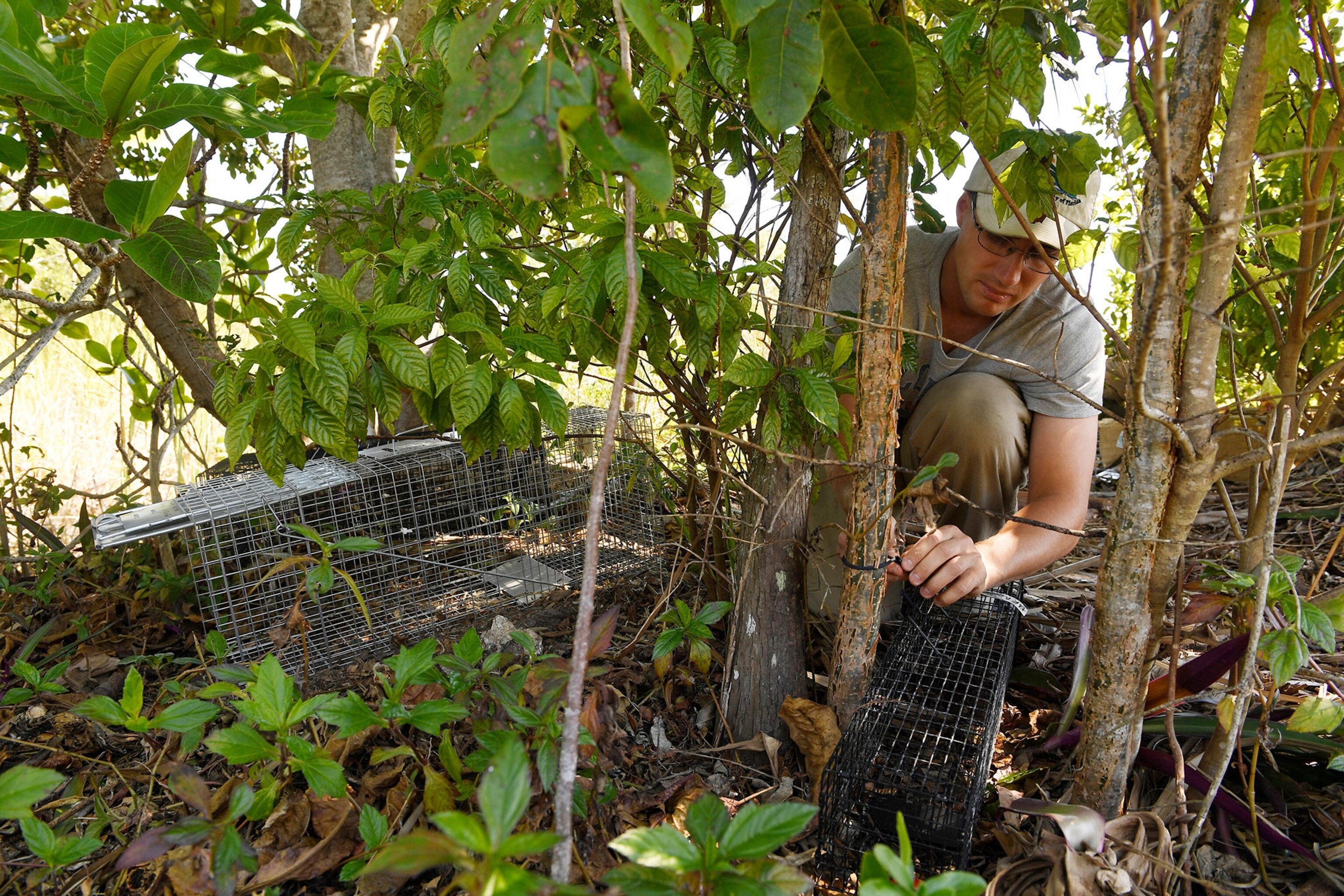
The Controversial Way Florida Researchers Are Dealing With Invasive Iguanas
Experts are in disagreement over the most humane—and legal—way to kill the invasive reptiles.
There's a bounty out for iguanas' heads in southeastern Florida.
A team of 15 researchers from the University of Florida have been hunting down invasive iguanas with captive bolt guns as part of a three-month, $63,000 research project. Contracted by the Florida Fish and Wildlife Conservation Commission, the project aims to remove the rampant reptiles. It will run until May.
In addition to skewering the reptiles' skulls with captive bolt guns, which are used to stun or kill commercial livestock, the team is also smashing the iguana's heads against solid objects, like the truck and boat they use to hunt the lizards down.
"Most of what we're doing is blunt force trauma," wildlife biologist Jenny Ketterlin tells Broward County's Sun-Sentinel.
The Hunt in Florida
It's legal to kill iguanas in Florida, since the invasive reptiles can destroy native plants and wildlife. But state law dictates the killing must only be in a humane manner. Experts recommend accomplishing this by shooting iguanas with pellet guns, stabbing them in the brain, or decapitating them without having them suffer. Although freezing the animals was once allowed, it's now illegal, along with drowning and poisoning. (Related: read about why frozen iguanas are falling from trees in Florida)
"The general guideline is to end the iguana's life instantly—suddenly and without any suffering," Zoo Miami animal ambassador Ron Magill told the Sun Sentinel in February, after an iguana was shot several times with a crossbow. "Hitting the iguana on the head with a shovel is OK, as long as you aim correctly and kill it in the first stroke. Hit it more than once and you could be charged with a crime."
Animal cruelty is a first-degree misdemeanor in Florida, which could spell one year in prison, a $5,000 fine, or both. Only professionals with the right licenses can inject lethal drugs to euthanize iguanas.
Ketterlin says brain impaling by bolt gun is the best way to humanely kill iguanas. She adds other methods, like decapitation without anesthesia, could be cruel.
In the dark of night, the researchers pair off and go after the iguanas hanging out near a canal in the town of Davie. So far, they've killed 249 iguanas, although some manage to escape. The dead iguanas are bagged and brought back to the lab, where they're weighed and measured. After, their bodies are taken to a nearby landfill that accepts animal carcasses.
"We are using flashlights to find them," Ketterlin tells the Sun Sentinel. "They are slow at first. If they're in a tree and wake up, they'll jump into the canal or jump onto the ground and run off."
The researchers are also trying to trap the lizards in county parks. The traps, which are baited with cherry tomatoes and watermelon, have only ensnared unlucky raccoons so far.

Invasive Issue
Some experts disagree that Ketterlin's methods are humane. Susan Kelleher, an exotic pet vet, says the brain bashing method is cruel. She says sedating and euthanizing the reptiles would be a better solution. Meanwhile, some residents seem unfazed by the violence, and others have resorted to killing the invasive reptiles themselves.
"I like all creatures, but they are not in their native environment," Floridian Eric Swalley tells media. "It's a horrible thing we need to combat and try to get a handle on. It's a biological nightmare."
Iguanas are native to the region extending from Central America through the Brazilian rainforest, but they're also some of the most popular reptile pets in the U.S. They stuck around in Florida after they were brought to the area in the 1960s.
Iguanas can destroy vegetation and wildlife, feeding on fruits, bird eggs, and other flora and fauna. Growing more than six feet long and weighing up to 11 pounds, the lizards can live eight years in the wild but 20 years in captivity.
Iguanas are also invasive to Puerto Rico, where they destroy crops, burrow under roadways, and repopulate rampantly. There, some residents have resorted to eating them, though it's illegal to sell iguana meat on the island.









